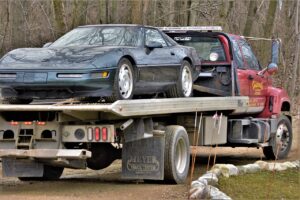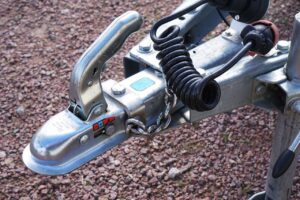Towing a heavy-duty trailer comes with significant responsibilities and safety considerations. Ensuring that you follow best practices for towing can prevent accidents, protect your cargo, and ensure a smooth and safe journey. This guide covers essential safety tips for towing with a heavy-duty trailer, from pre-trip preparations to on-the-road precautions.
1. Perform a Pre-Trip Inspection
Before hitting the road, conduct a thorough inspection of your trailer and towing vehicle.
Key Points:
- Check Tire Pressure: Ensure all tires on both the trailer and towing vehicle are properly inflated according to the manufacturer’s specifications. Under-inflated tires can lead to blowouts and poor handling.
- Inspect Lights and Signals: Verify that all lights and signals (brake lights, turn signals, tail lights) are functioning correctly. Faulty lighting can lead to accidents and violations.
- Examine Brakes: Check the condition of the trailer’s brakes and the brake controller in the towing vehicle. Properly functioning brakes are crucial for stopping safely.
- Secure Loads: Ensure that the load is evenly distributed and securely fastened. An unbalanced or loose load can cause swaying and loss of control.
2. Use the Right Equipment
Using the appropriate towing equipment is essential for safety and performance.
Key Points:
- Hitch and Receiver: Choose a hitch and receiver rated for the weight of your trailer. An inadequate hitch can lead to dangerous detachment.
- Safety Chains: Always use safety chains, crossing them under the hitch to catch the trailer tongue if it detaches.
- Weight Distribution Hitch: For heavy loads, consider using a weight distribution hitch to evenly distribute the trailer’s weight across the axles of the towing vehicle.
- Electronic Brake Controller: Install an electronic brake controller to ensure the trailer’s brakes are properly synchronized with the towing vehicle’s brakes.
3. Understand and Adhere to Weight Limits
Overloading your trailer can lead to severe handling and braking issues.
Key Points:
- Gross Vehicle Weight Rating (GVWR): Know the GVWR of your trailer and ensure the combined weight of the trailer and its contents does not exceed this limit.
- Tongue Weight: The tongue weight should be 10-15% of the trailer’s total weight. Incorrect tongue weight can cause swaying and poor handling.
- Towing Capacity: Ensure your towing vehicle is rated to handle the weight of the trailer and its load.
4. Practice Safe Driving Techniques
Towing a heavy-duty trailer requires modified driving techniques to maintain control and safety.
Key Points:
- Maintain Safe Speeds: Drive at moderate speeds, especially on highways. High speeds can increase the risk of swaying and make stopping more difficult.
- Allow Extra Stopping Distance: Heavy trailers require longer stopping distances. Leave plenty of space between your vehicle and the one ahead.
- Avoid Sudden Movements: Make gradual lane changes and turns to avoid destabilizing the trailer.
- Watch for Swaying: If the trailer begins to sway, gently apply the trailer brakes manually without using the towing vehicle’s brakes to regain control.
5. Be Prepared for Emergencies
Having a plan for potential emergencies can make a significant difference in safety.
Key Points:
- Emergency Kit: Carry an emergency kit that includes tools, spare tire, jack, reflective triangles, and a fire extinguisher.
- Roadside Assistance: Consider enrolling in a roadside assistance program that covers towing services for trailers.
- Know Your Route: Plan your route ahead of time and be aware of any road restrictions or steep inclines that could pose challenges.
6. Follow Local Laws and Regulations
Adhering to local laws and regulations is crucial for legal and safe towing.
Key Points:
- Licensing Requirements: Ensure you have the appropriate driver’s license for towing heavy trailers. Some regions require special endorsements.
- Speed Limits: Observe posted speed limits for vehicles towing trailers, which are often lower than for passenger vehicles.
- Towing Restrictions: Be aware of any towing restrictions, such as lane usage and entry bans in certain areas.
Conclusion
Towing a heavy-duty trailer safely involves careful preparation, the right equipment, and mindful driving techniques. By following these safety tips, you can ensure a safer journey for yourself and others on the road. For high-quality, reliable trailer wiring harnesses and other towing equipment, visit WiringLabs and explore our range of products designed to enhance your towing experience.




